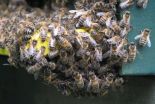(Press-News.org) Following several years of study, investigators have found more evidence that viral therapy to treat solid tumors can be enhanced by blocking the body's natural immune response.
Oncolytic viruses have shown promise as anticancer agents, with variations of the herpes simplex virus (HSV) among the most commonly used. However, many studies have shown that the effectiveness of viral therapy to eradicate tumors has not been as successful with patients as it has been in the lab. These results have led researchers to examine the body's immune system response to determine what effect it may have toward decreasing the effectiveness of viral therapy.
A new study, published in the March 12, 2013 issue of Molecular Therapy and led by Timothy Cripe, MD, PhD, division chief of Hematology/Oncology and Bone Marrow Transplantation at Nationwide Children's Hospital, is shedding additional light on how viral therapy combined with a suppressed immune response could be more effective against solid tumors.
Dr. Cripe and a team of investigators studied the effects of vascular endothelial growth factor (VEGF), a substance commonly released during an immune, or pro-inflammatory, response to a viral infection. VEGF is responsible for angiogenesis, new blood vessel growth near an injured or infected site.
VEGF is also important for tumor growth, raising the possibility that its response to virus infection might get in the way of viral therapy.
"We sought to determine if a pro-angiogenic response occurs during viral therapy for cancer, to what extent it may limit antitumor effectiveness, and if it could be counteracted by antiangiogenic therapy," explains Dr. Cripe, who is also a professor of Pediatrics at The Ohio State University College of Medicine.
Their research demonstrates that an anti-VEGF antibody markedly enhances the anti-tumor effect of an oncolytic virus (oHSV) injected into a tumor. They also discovered that the anti-tumor effect was due to both enhanced antiangiogenesis and the modulation of the tumor's immune response. However the effect was not due to the virus replicating within the tumor.
"One of the most important outcomes of this study is the strong rationale for developing a clinical trial combining the use of oHSV and the FDA-approved anti-VEGF product, bevacizumab," said Dr. Cripe. "Virus therapy or anti-VEGF therapy alone each independently prolonged survival of mouse models implanted with Ewing sarcoma, but all of those mice eventually succumbed to their cancer. In contrast, the combination of virus and anti-VEGF therapies cured 90 percent of the mice. Virus therapy is a very promising area of cancer treatment, and studies such as these will bring us even closer to success."
Future studies will be developed to determine if immune responses vary among tumor types and if targeted therapy for specific aspects of the immune response will be more effective than completely suppressing the immune system.
###
This work was funded by the National Institutes of Health and supported by The Research Institute at Nationwide Children's Hospital, Cincinnati Children's Hospital Medical Center Division of Hematology/Oncology, The Limb Preservation Foundation, teeoffagainstcancer.org, the Katie Linz Foundation, TeamConnor.org, Cancer Free Kids and the American Cancer Society. END
Evidence supports blocking immune response to enhance viral therapy against solid tumors
2013-03-13
ELSE PRESS RELEASES FROM THIS DATE:
Bradley Hospital researchers find age-related changes in how autism affects the brain
2013-03-13
EAST PROVIDENCE, R.I. – Newly released findings from Bradley Hospital published in the Journal of the American Academy of Child & Adolescent Psychiatry have found that autism spectrum disorders (ASD) affect the brain activity of children and adults differently.
In the study, titled "Developmental Meta-Analysis of the Functional Neural Correlates of Autism Spectrum Disorders," Daniel Dickstein, M.D., FAAP, director of the Pediatric Mood, Imaging and Neurodevelopment Program at Bradley Hospital, found that autism-related changes in brain activity continue into adulthood. ...
Events in the future seem closer than those in the past
2013-03-13
We say that time flies, it marches on, it flows like a river — our descriptions of time are closely linked to our experiences of moving through space. Now, new research suggests that the illusions that influence how we perceive movement through space also influence our perception of time. The findings provide evidence that our experiences of space and time have even more in common than previously thought.
The research, conducted by psychological scientist Eugene Caruso of the University of Chicago Booth School of Business and colleagues, is published in Psychological ...
Study reveals 10 factors in wrongful conviction cases
2013-03-13
Why do innocent people go to jail in the United States every year for violent crimes they did not commit? It's a serious question representing the ultimate miscarriage of justice—taking away the freedom of a factually innocent person while also allowing the guilty person to remain free. The U.S. Department of Justice's National Institute of Justice (NIJ) wanted to learn answers to prevent wrongful convictions in the first place.
Jon B. Gould, J.D., Ph.D., a professor and the director of the Washington Institute for Public and International Affairs Research at American ...
Punishment can enhance performance, Nottingham academics find
2013-03-13
The stick can work just as well as the carrot in improving our performance, a team of academics at The University of Nottingham has found.
A study led by researchers from the University's School of Psychology, published recently in the Journal of Neuroscience, has shown that punishment can act as a performance enhancer in a similar way to monetary reward.
Dr Marios Philiastides, who led the work, said: "This work reveals important new information about how the brain functions that could lead to new methods of diagnosing neural development disorders such as autism, ADHD ...
Normal prion protein regulates iron metabolism
2013-03-13
An iron imbalance caused by prion proteins collecting in the brain is a likely cause of cell death in Creutzfeldt-Jakob disease (CJD), researchers at Case Western Reserve University School of Medicine have found.
The breakthrough follows discoveries that certain proteins found in the brains of Alzheimer's and Parkinson's patients also regulate iron. The results suggest that neurotoxicity by the form of iron, called redox-active iron, may be a trait of neurodegenerative conditions in all three diseases, the researchers say.
Further, the role of the normal prion protein ...
Ancient Chinese coin found on Kenyan island by Field Museum expedition
2013-03-13
A joint expedition of scientists led by Chapurukha M. Kusimba of The Field Museum and Sloan R. Williams of the University of Illinois at Chicago has unearthed a 600-year-old Chinese coin on the Kenyan island of Manda that shows trade existed between China and east Africa decades before European explorers set sail and changed the map of the world.
The coin, a small disk of copper and silver with a square hole in the center so it could be worn on a belt, is called "Yongle Tongbao" and was issued by Emperor Yongle who reigned from 1403-1425AD during the Ming Dynasty. The ...
Answering messages behind the wheel is as dangerous as being twice over the limit
2013-03-13
Scientists from various Australian universities in collaboration with the University of Barcelona have compared the effects of mobile use while driving with the effects of alcohol using a simulation. Their experiment demonstrates that using a handsfree kit or sending text messages is the same as being above the legal alcohol limit.
The Australian universities of Wollongong, Victoria, Swinburne of Technology, the Institute for breathing and sleep and the University of Barcelona have measured the reaction capacity behind the wheel of twelve healthy volunteers who participated ...
Immune cells cluster and communicate 'like bees,' researcher says
2013-03-13
The immune system's T cells, while coordinating responses to diseases and vaccines, act like honey bees sharing information about the best honey sources, according to a new study by scientists at UC San Francisco.
"In the morning, each bee goes looking individually for a sugar source, then comes back to the hive and does a dance in front of the other bees describing the location of what it's found, which helps the hive decide collectively where the best source is," said senior scientist Matthew Krummel, PhD, a UCSF professor of pathology.
They don't bust the same ...
UT study identifies ways children can meet recommended activity goals
2013-03-13
KNOXVILLE—Despite overwhelming evidence about the benefits of physical activity for children, most American youngsters are not meeting the federal recommendation of 60 minutes a day.
A new study by a team of University of Tennessee researchers has identified specific ways—and estimated minutes for each approach—that can help children achieve the recommended daily physical activity goal.
The results of various approaches, ranging from mandatory physical education in school to changes in playground designs, were published recently in the American Journal of Preventive ...
Polo takes the bait
2013-03-13
KANSAS CITY, MO—A seemingly obscure gene in the female fruit fly that is only active in cells that will become eggs has led researchers at the Stowers Institute for Medical Research to the discovery of a atypical protein that lures, traps, and inactivates the powerful Polo kinase, widely considered the master regulator of cell division. Its human homolog, Polo-like kinase-1 (Plk1), is misregulated in many types of cancer.
Stowers Investigator and senior author R. Scott Hawley, Ph.D., hopes that this highly selective kinase trap might give drug developers, who are working ...



